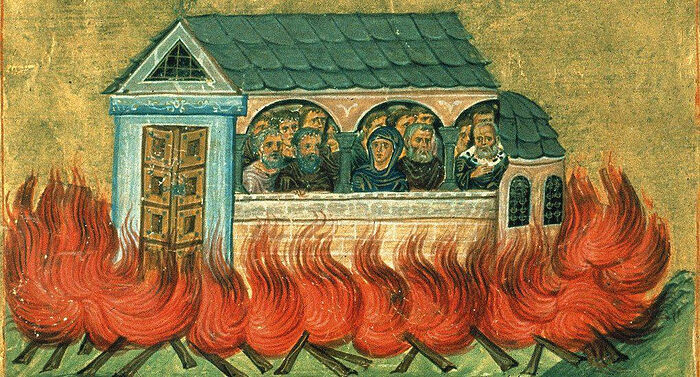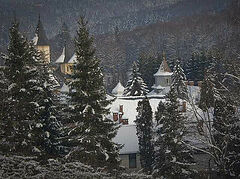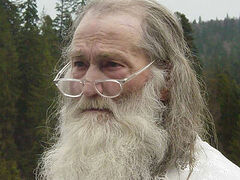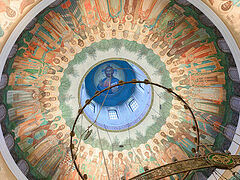Whosoever therefore shall confess Me before men,
him will I confess also before My Father Which is in Heaven.
But whosoever shall deny Me before men,
him will I also deny before My Father Which is in Heaven
(Mt. 10:32-33).
He that loveth father or mother more than Me is not worthy of Me:
and he that loveth son or daughter more than Me is not worthy of Me.
And he that taketh not his cross, and followeth after Me,
is not worthy of Me
(Mt. 10:37-38).
Then answered Peter and said unto Him, Behold, we have forsaken all,
and followed Thee; what shall we have therefore?
And Jesus said unto them, Verily I say unto you,
That ye which have followed Me,
in the regeneration when the Son of Man shall sit in the throne of His glory,
ye also shall sit upon twelve thrones, judging the twelve tribes of Israel.
And every one that hath forsaken houses, or brethren, or sisters,
or father, or mother, or wife, or children, or lands, for My name’s sake,
shall receive an hundredfold, and shall inherit everlasting life.
But many that are first shall be last; and the last shall be first
(Mt. 19:27-30).
The Gospel tells us about some difficult things…
that are carried out by the saints. The first or second time I went to Holy Mount Athos, I visited Burazeri—a Russian cell with Greek monks living in it, including two Cypriot monks. At that time, I was trying to decide whether to stay on the Holy Mountain. This was 1976, when the Holy Mountain was completely cut off from the world, and on Cyprus they didn’t even know about the existence of Athos—because, I remember, we had to take entrance exams for school, and my knowledge was so “broad” that for the question about where Christ was born, I wrote on the test: “On the Holy Mountain,” instead of Bethlehem.
And why did I write that? Because I had no connection with religion, but I remembered a New Year’s song about Ayavasil (Greek Santa Claus) and the Holy Mountain, or something like that. These things got connected in my head, and I wrote, “On the Holy Mountain.”
And when I got there, I began wavering about whether or not I should stay. I both wanted to stay and was afraid to stay, because I kept thinking, what about my mother, what will happen to Cyprus?... I had the thought: “What will happen if a war breaks out on Cyprus and I’m here?” As if I could save Cyprus with my presence… a hero! What nonsense can people come up with! I thought: “And if a war starts, and I’m here? How will I be able to endure it?” I felt like a fighter on the front line of this war!
At noon, we were gathering for lunch. And I had such thoughts swirling around my head. At that time, there were no lotus flowers in Cyprus—now there are. And here, one monk of holy life, now reposed, Fr. Ioannikios, a Cypriot monk, said to me:
“Let’s go eat a lotus!”
“What kind of fruit is that?” I asked.
“They don’t have it in Cyprus. It’s the same thing that Odysseus ate and then forgot about Ithaca.”
“What are you saying?” I gasped.
“Eat it, and you’ll forget about Cyprus!” he said jokingly.
But I was so naïve and stupid that I told him I didn’t want any. So I didn’t eat any. I believed him that if I ate it, I’d forget about Cyprus!
He told me:
“Come on! Eat it—nothing bad will happen to you!”
“No, no, it’s out of the question!” I refused.
The fathers laughed, so silly and ridiculous my stubbornness was. But I didn’t want to, I couldn’t even think about forgetting Cyprus.
So, the words of Christ are heavy…
because it’s difficult when you hear: “Leave everything! Leave your mother, father, brothers, children, land, houses, knowledge, everything!” Christ says absolute things here to help us stop being wimpy and become strong, lively people.
Behind every person who follows Christ there’s a hidden rejection of many things. You can’t follow Christ unless you decide to give up something. Of course, if you stay in the world, you won’t have to renounce your mother or your mother-in-law—especially her—or your boss, or anyone else, but you’ll certainly have to renounce your will, your passions, selfishness, avarice, sensuality, vainglory—and these things are harder to give up than others.
One young man came to us, intending to become a monk on the Holy Mountain. He had renounced his parents, his friends, his degrees, money, only he couldn’t give up his stamp collection! He couldn’t! When the Elder saw a pile of albums in his cell, he asked:
“What’s that?”
“Stamps, Geronda.”
“And why did you bring them here? What do you need them for?”
“I’ve loved collecting stamps since I was a little boy.”
“Well, alright, since you brought them here,” (and it was winter), “then they’ll be good for kindling the stove! Now, when we light the stove, burn them bit by bit!”
And this poor fellow turned pale, then green, then he blushed, and said:
“I can’t do that.”
“Well, if you can’t, then take them and leave!”
That was it! There was no second word from the elders. I went to the man and told him:
“So, you left your mother, father, and brothers, but these pathetic little stamps you can’t give up?”
And the Elder was categorical:
“Either burn them or get out!”
And when he saw me coming to him, he added:
“And it won’t be anyone else who burns them! You’re not going to give them to Fr. Athanasios to burn them—you’re going to burn them yourself!”
I tried to intercede for him:
“Isn’t a shame to destroy such lovely stamps? Geronda, he worked so hard to collect them. Okay, so we’re not going to keep them for ourselves—what do we need them for in the desert? But let’s keep them, and maybe some young man will come, and he’ll give them to him to enjoy.”
“No! He’s going to burn them himself!”
And that’s what happened. If any stamp expert is listening to us, I’m afraid what trouble it’ll give us. But such things aren’t valued there on the Holy Mountain.
Christ is absolute in order to help a man be brave…
so he won’t be cowardly, fearful, half-hearted. Christ clearly says:
Whosoever therefore shall confess Me before men, him will I confess also before My Father Which is in Heaven. But whosoever shall deny Me before men, him will I also deny before My Father Which is in Heaven
(Mt. 10:32-33).
These words of Christ have filled the Church with martyrs. Millions of martyrs who have suffered immeasurable, inhuman torments, and not only adults. Let’s say a man of thirty or thirty-five—okay, he can endure them; he’s being tortured, but he’s a warrior. But little children, little girls? St. Marina was fifteen, St. Barbara was sixteen, St. Irina was a young woman, St. George was twenty, St. Stephen also was twenty. Or babies. St. Cyricus was three; St. Valerian was sixteen-months-old when the emperor took him from his mother and asked:
“Who is the true God?”
The child replied:
“Christ!”
Then he threw him from the throne right onto the marble floor, and the child died. A martyr of the Church. A saint.
And when they tried to tell St. Cyricus, a child, that Christ isn’t God, he hit the ruler, who then threw him straight into the fire.
So, these words of Christ have filled the Church with martyrs. And if they had renounced Christ, what would have happened then? If they had been afraid? St. Barbara was slaughtered by her own father. If this girl, this sixteen-year-old girl had renounced Christ, what would have happened? Of course, she would have lost her crown of life. However, God gave her strength; and strange and incredible though it may seem, know that all this was done by the power of God, and therefore it’s said: Whosoever therefore shall confess Me before men, that is, “by My grace and power.”
God gives man strength. When man wants it, he receives strength. And when he doesn’t want it, he doesn’t receive it. Therefore, when some say, “I can’t,” it doesn’t stand up to criticism. Well, okay, we agree: A man can’t do it. “I want to, but I can’t!” But then it means our will isn’t so categorical, because if we really wanted something, then God would give us the strength to do what we want to do. If we don’t accept strength, that means we probably don’t want it as much as we should, or there are some other reasons that God knows about. In any case, with God’s strength, man follows Christ in an absolute way.
As I said before, these words don’t have a literal application to every instance, because someone might say:
“Well, okay, but what about us who haven’t become monks and ascetics and live with our mother, father, children, who have land—what will happen to us? Is there really no room for us in the Kingdom of God?”
In fact, Christ didn’t say this. He said whoever loves all this “more than Me.” If you love your wife, husband, children, your land more than Christ, then you are truly unworthy of Him.
I remember one poor mother whose son decided to become a monk. Fortunately, not in Cyprus, and fortunately not in a monastery that I know. She came crying and saying:
“It’s my fault! I took him to church, I took him to Confession. It’s my fault that he went and became a monk.”
“You’re to blame, of course, but who else?” I asked her.
It’s good that I’m not to blame, as I usually am. But just think how a person might look at it. In the end, it means you love Christ only as long as He serves you. When you want your child to listen to you, to be smart and bring home good grades; when you want to make sure your husband doesn’t go to other women, or your wife to other men, then Christ is useful to you, because He made another “good child.” But if this good child believes in what Christ says here, and, to your misfortune, goes to put it into practice, then the Gospel becomes bitter for you and you start blaming God.
Since I’ve been accused many times, and even now, of brainwashing—so they say; you’ve heard about it—they talk about it in season and out of season—then I say:
“Well, all right. When they bring me to trial, I’ll take the Gospel with me and say if there’s someone that has to be put in prison, it’s Christ. And what am I guilty of? Was it me who told people to go and become monastics? He said it!”
I can complain about Him myself, because I’m a victim myself [laughs], and I’ll even bring my mother along [laughs]—I believed what Christ said and I went and did it. Of course, I only did half of it, because we haven’t finished the rest yet. But we’ve taken the first steps at least.
Christ said these things, not man. But so you know that when a man is freed from earthly attachments and loves Christ most of all—and I repeat, not so that you give up your parents and land, but so you wouldn’t love them more than Christ, and so it would be not them but Christ Who determines your whole life, then you can really live in the freedom of God.
Then, as Christ says, And every one that hath forsaken houses, or brethren, or sisters, or father, or mother, or wife, or children, or lands, for My name’s sake, shall receive an hundredfold, and shall inherit everlasting life (Mt. 19:29-30). God will give you a hundred times more. This is truly a great reality. God doesn’t say anything untruthful; He is the only one Who will never push man away, never betray or disappoint him. We don’t have to say, “You know, we believed Christ, and look what came of it!”
This will never happen. Christ is true to His word, and what He said is confirmed to an extraordinary degree, that is, you’ll get not a hundredfold, but even a thousandfold. And not only what you’re able to understand, but also those blessings that are much greater—God gives all of this to a man who out of love for Him overcomes the attraction of this world and confesses Christ.
The confession of Christ affects all things, from the smallest to the most complex
From making the Sign of the Cross when you sit down to eat, to wearing a cross, to someone asking if you believe in Christ and you answering: “Of course! I believe!”—this is confession.
Did you know that if someone asks you if you believe in Christ and you say: “I don’t believe,” even as a joke, you’re deprived of your Baptism? This is a renunciation of Christ! As a rule, you must be chrismated again when you return to the bosom of the Church.
Here’s an incident from the life of St. Paisios the Great. His disciple went to sell his handiwork and met some Jews who told him that Christ isn’t God.
To get rid of them, because he had no desire to have a discussion with them, he told them:
“Well, it’s probably as you say.”
When he returned, St. Paisios the Great said to him:
“Who are you?”
“Father, I’m your disciple!”
“My disciple is a Christian. But you’re not baptized. You have no Baptism. Where is your Baptism?”
He lost his Baptism. The saint saw it by the grace of the Holy Spirit, and then it required great asceticism and repentance for the grace of Holy Baptism to return and the disciple to again be accepted into the Church.
Therefore, the confession of Christ is no joking matter: Either we confess Christ and will be with Him, or if we renounce Him, that means we have cut Him off and are cut off from Him. If we want to return, we have to repent and receive Chrismation again in order to be in the Church again.
Here the Word of God is absolute. And it’s that way for our own good, to help us be reasonable people, serious in our relationship with God, consistent and courageous, and so we would put all our trust in Christ.
To be continued…




